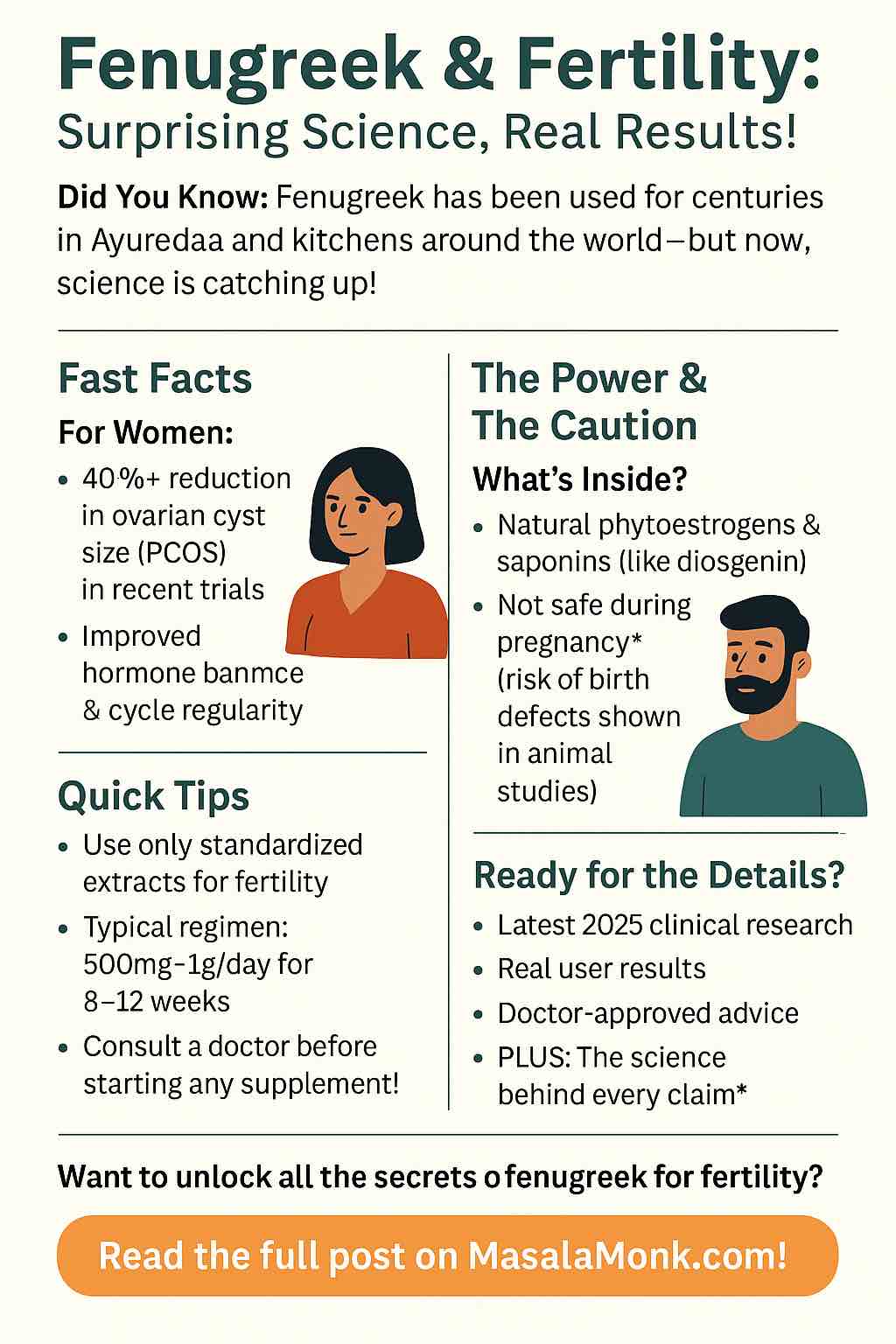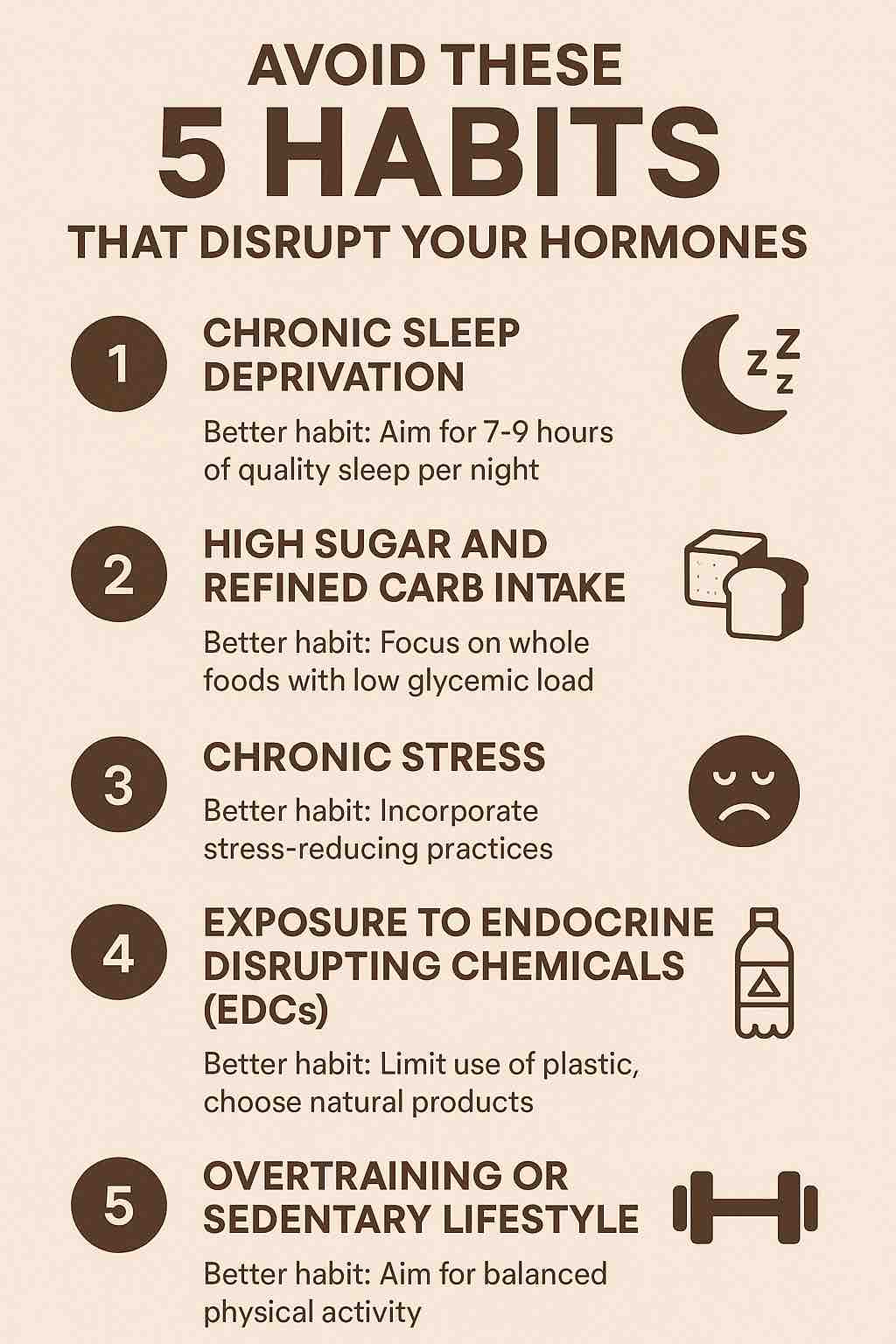
If you’ve searched for natural ways to boost fertility or balance hormones, you’ve likely stumbled upon fenugreek. This humble herb—long prized in Indian kitchens and traditional medicine—has exploded in popularity for everything from balancing blood sugar to enhancing lactation. But can fenugreek actually improve fertility? And if so, for whom, and how safely?
This guide unpacks the latest research, including brand new clinical trials (2023–2025), real-world tips, and essential cautions so you can make the most informed choices on your fertility journey.
What Is Fenugreek?
Fenugreek (Trigonella foenum-graecum) is an annual plant whose seeds are packed with fiber, saponins (especially diosgenin), and phytoestrogens. Traditionally used as a digestive aid, to increase milk supply, or even as a natural testosterone booster, modern science is just catching up with its complex effects on reproductive health.
The Potential Benefits of Fenugreek for Fertility
1. Fenugreek and Female Fertility
A. PCOS and Hormone Balance
Polycystic Ovary Syndrome (PCOS) is a common cause of infertility due to hormone imbalances and cysts. Recent studies on standardized fenugreek extracts (notably Furocyst®) show real promise:
- 2025 Clinical Trial: Women with PCOS who took 1g/day of Furocyst for 12 weeks had a >40% reduction in ovarian cyst size, better cycle regularity, and improved hormone profiles (higher LH/FSH ratio, lower androgens, reduced insulin resistance) .
- Menstrual Health: Fenugreek’s phytoestrogens may help regulate cycles, ease cramps, and address mild hormone imbalances—even outside of PCOS.
B. Emerging Research: Diminished Ovarian Reserve
A new clinical trial (Libifem®, India, 2025) is testing fenugreek for women with diminished ovarian reserve, a group with few natural treatment options. Results are pending, but this signals growing recognition of fenugreek’s unique hormonal effects.
2. Fenugreek and Male Fertility
A. Testosterone and Sperm Quality
For men, fenugreek is frequently marketed as a testosterone booster. Recent human studies have started to support this reputation:
- 2024 PLOS One Trial: 600–1800mg/day of Trigozim® fenugreek extract for 12 weeks led to a 13% increase in total testosterone and a 16% increase in free testosterone index among middle-aged men. No significant side effects were reported.
- Sperm Parameters: Smaller studies with Furosap® show improvements in sperm motility, morphology, and libido.
B. How Does It Work?
Fenugreek seeds contain diosgenin and steroidal saponins, which can impact the body’s androgenic and estrogenic pathways, supporting both hormone production and balance.
How to Use Fenugreek for Fertility: Practical Guidelines
A. Forms and Dosages
- Extracts: Most successful studies use branded, standardized extracts (e.g., Furocyst®, Furosap®, Trigozim®, Libifem®) at 500mg–1g/day.
- Whole Seeds/Powder: Widely available, but potency and dosing are less predictable.
- Duration: Typical regimens last 8–12 weeks. Longer use should only be under medical supervision.
B. Who Might Benefit Most?
- Women with PCOS: Especially those struggling with irregular cycles, high androgens, or insulin resistance.
- Men with low testosterone or poor sperm quality: Looking for a natural adjunct to lifestyle and medical therapy.
- People seeking mild hormone balance: Such as those with mild cycle irregularity or low libido.
Cautions and Red Flags
1. Pregnancy Risks
Do not use fenugreek supplements if you are pregnant or planning to conceive imminently. New toxicology reviews (2025) confirm high risk for birth defects and pregnancy complications. Fenugreek may stimulate uterine contractions and cause developmental harm to the fetus.
2. High-Dose/Long-Term Use
Animal studies consistently show that high doses or chronic use may harm fertility in both males and females, causing:
- Hormonal imbalances
- Ovarian and testicular degeneration
- Reduced sperm counts
- Fetal resorption (pregnancy loss in animals)
3. Drug Interactions and Side Effects
Fenugreek can lower blood sugar, so monitor closely if you have diabetes or take related medications. Minor side effects can include GI discomfort, body odor, or allergic reactions.
4. Stick to Standardized Extracts
Effects vary with preparation. The most promising and safe results come from standardized extracts tested in clinical trials—not generic powders or teas.
The Bottom Line: Should You Try Fenugreek for Fertility?
Fenugreek is not a miracle cure, but for certain groups—especially women with PCOS or men with mild hormone issues—it offers a natural, evidence-based option for modest improvement. Use it as a complement to medical care and a healthy lifestyle, not a replacement.
Always discuss with your doctor or fertility specialist first, especially if you are pregnant, planning pregnancy, or taking other medications.
Key Takeaways
- PCOS: Fenugreek extract (1g/day for 12 weeks) may shrink cysts and regulate cycles.
- Men: Standardized extracts can boost testosterone and sperm quality.
- Safety: Avoid in pregnancy; stick to moderate doses; favor clinically tested extracts.
- Evidence: Research is growing fast, but more large-scale, randomized human studies are needed.
- Stay Informed: Watch for the results of ongoing clinical trials, especially for diminished ovarian reserve.
Want to Learn More?
- Ask your provider about clinically tested fenugreek extracts for fertility support.
- If you try fenugreek, track your cycles, hormone panels, and symptoms closely—and report any changes or side effects.
Nature offers hope, but smart science keeps us safe. Stay curious, stay careful—and here’s to your journey!
References available upon request; all clinical trial data referenced is from peer-reviewed journals and ongoing registry updates through mid-2025.
FAQs on Fenugreek and Fertility
1. Can fenugreek really help with fertility?
Fenugreek may help specific fertility challenges, especially in women with PCOS and men with low testosterone, based on recent clinical trials using standardized extracts. However, results vary and more research is needed.
2. Is it safe to take fenugreek when trying to conceive?
For most healthy adults, moderate use of standardized fenugreek extracts for a limited period appears safe. However, avoid fenugreek if you are pregnant or planning to conceive imminently, as animal studies show potential risks to fetal development.
3. How does fenugreek support women’s fertility?
Fenugreek can help regulate menstrual cycles, reduce ovarian cysts, and balance hormones in women with PCOS. Its phytoestrogens and saponins are believed to be responsible for these effects.
4. Does fenugreek improve male fertility?
Some studies show fenugreek extract can increase testosterone levels and may improve sperm quality and libido. Results are most significant with standardized extracts over about 12 weeks.
5. What’s the recommended dose of fenugreek for fertility?
Most clinical trials use 500mg–1g per day of a standardized extract for 8–12 weeks. Dosing for generic fenugreek powders or teas is not well established for fertility purposes.
6. Can fenugreek cause side effects or interact with medications?
Possible side effects include digestive upset, body odor, or mild allergic reactions. Fenugreek can lower blood sugar, so use caution if you take diabetes medications or have hypoglycemia.
7. Is it safe to use fenugreek supplements during pregnancy?
No. Fenugreek should not be used during pregnancy due to the risk of stimulating uterine contractions and potential harm to the fetus.
8. Are fenugreek seeds or powders as effective as extracts?
Clinical benefits for fertility are almost entirely based on studies using standardized extracts (like Furocyst, Furosap, Libifem). Seeds or powders may not provide the same effects or reliability.
9. How long does it take to see results from fenugreek for fertility?
Most studies report changes within 8–12 weeks of consistent use. Track your progress and consult your healthcare provider to assess effectiveness and safety.
10. Should I consult a doctor before starting fenugreek for fertility?
Yes. Always talk to your doctor or fertility specialist before starting any new supplement, especially if you have underlying health conditions, take medications, or are planning to become pregnant.










